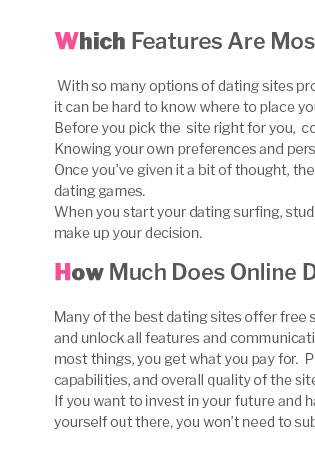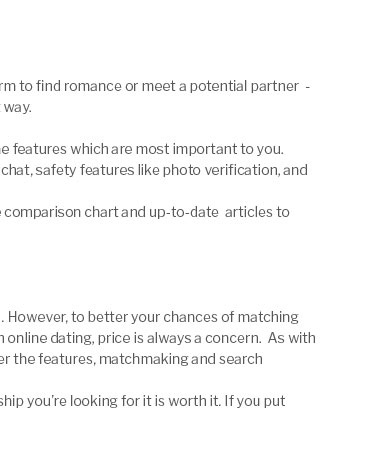best app for married affairs: insights and cautionsWhat people usually mean by “best app”When someone asks for the best app for married affairs, they’re often seeking privacy, clear boundaries, and like-minded communities. It’s a sensitive topic with real emotional and practical stakes, so aim for choices that put consent, safety, and honesty first. Your wellbeing matters more than any app. What to prioritize in any platform- Consent-first design: Profile fields for relationship status and boundaries, plus prompts that encourage transparent expectations.
- Privacy and data practices: Transparent policies, limited data retention, end-to-end encrypted messaging, and optional blurring or masking of photos.
- Verification and safety tools: Photo or ID checks, report/block tools, and active moderation to curb harassment or impersonation.
- Community rules: Clear guidance against coercion and doxxing, and swift action on violations.
- Payment clarity: Upfront pricing, easy cancellation, and no dark patterns.
- Control over discovery: Fine-grained location controls, visibility settings, and the ability to hide from contacts.
Consent and clarity beat secrecy. Categories instead of a single “best”Consent-focused ENM and open-relationship communitiesApps that center ethical non‑monogamy and boundaries can reduce mixed signals and mismatched expectations. Discussions around lifestyle hookups can help you learn the language of consent, agreements, and safer dating dynamics. Mainstream dating apps with privacy controlsSome widely used platforms offer robust safety features, strong reporting, and visibility controls. You can set clear profile statements about boundaries and what you are or aren’t seeking. Private messaging plus firm personal boundariesEven if an app has solid chat tools, your personal digital hygiene matters: strong authentication, mindful photo sharing, and caution with identifiable details. Tools cannot replace thoughtful choices. Location and community contextCultural norms, local expectations, and community size affect discretion and comfort. Regional guides and local meetups can vary in tone and safety; explore carefully. If you travel or explore regionally, resources like hook up in cairo egypt show how local context shapes expectations and etiquette. Risks and reality checksAffairs carry emotional risks, potential breaches of trust, and digital exposure. Screenshots, account compromises, and social fallout are real possibilities. Ask yourself what outcomes you can live with, and whether a different conversation at home might be the kinder path. - Red flags: Pressure to move fast, requests for money, refusal to verify, or manipulative behavior.
- Digital footprint: Any shared detail can travel; share only what you’re prepared to see elsewhere.
- Emotional complexity: Multiple relationships need bandwidth, empathy, and clear boundaries.
No app can remove consequences. A responsible vetting checklist- Read the privacy policy end‑to‑end; look for encryption, minimal data collection, and options to delete your data.
- Evaluate moderation: active safety teams, fast response to reports, and visible community guidelines.
- Start with minimal information; add details only as trust builds.
- Align personal boundaries: decide what’s okay, what’s not, and how you’ll communicate that.
- Have an exit plan: know how to delete your account and remove shared content.
Healthier alternatives to secret affairsSome needs are better addressed through candid relationship talks, therapy, or renegotiated agreements. Ethical non‑monogamy frameworks emphasize consent and communication, which can reduce harm compared with secrecy. Honesty saves pain. FAQIs using an app for married affairs always unethical?Ethics hinge on consent. If a relationship includes explicit agreements that allow outside connections, using an app within those boundaries may be ethical. Secret activity that violates agreements is likely to cause harm. Clarity, consent, and respect are the baseline. What features signal a safer platform?Look for strong privacy controls, encrypted messaging, account verification, comprehensive reporting tools, active moderation, and clear community guidelines. Bonus points for data minimization, transparent billing, and straightforward account deletion. How can I protect my privacy without crossing ethical lines?Use unique passwords and multi‑factor authentication, limit identifiable photos, and share only necessary details. Keep your boundaries visible on your profile. Privacy should support safety and consent, not deception or harm. Should I pay for a premium plan?Paid tiers sometimes add verification, better filtering, or enhanced safety tools. Weigh the value against privacy trade‑offs and cancellation ease. If a free tier lets you assess culture and moderation, start there before upgrading. How do I avoid scams and catfishing?Decline money requests, keep conversations in‑app until trust builds, use video or photo verification, and report suspicious behavior. If someone resists any safety step or pushes for fast intimacy, treat it as a warning sign. What if I’m unhappy in my relationship?Consider direct conversation, counseling, or exploring mutually agreed structures. Many people discover that addressing needs openly leads to less harm than secrecy. If agreements aren’t possible, reflect on your values and long‑term wellbeing.

|




















